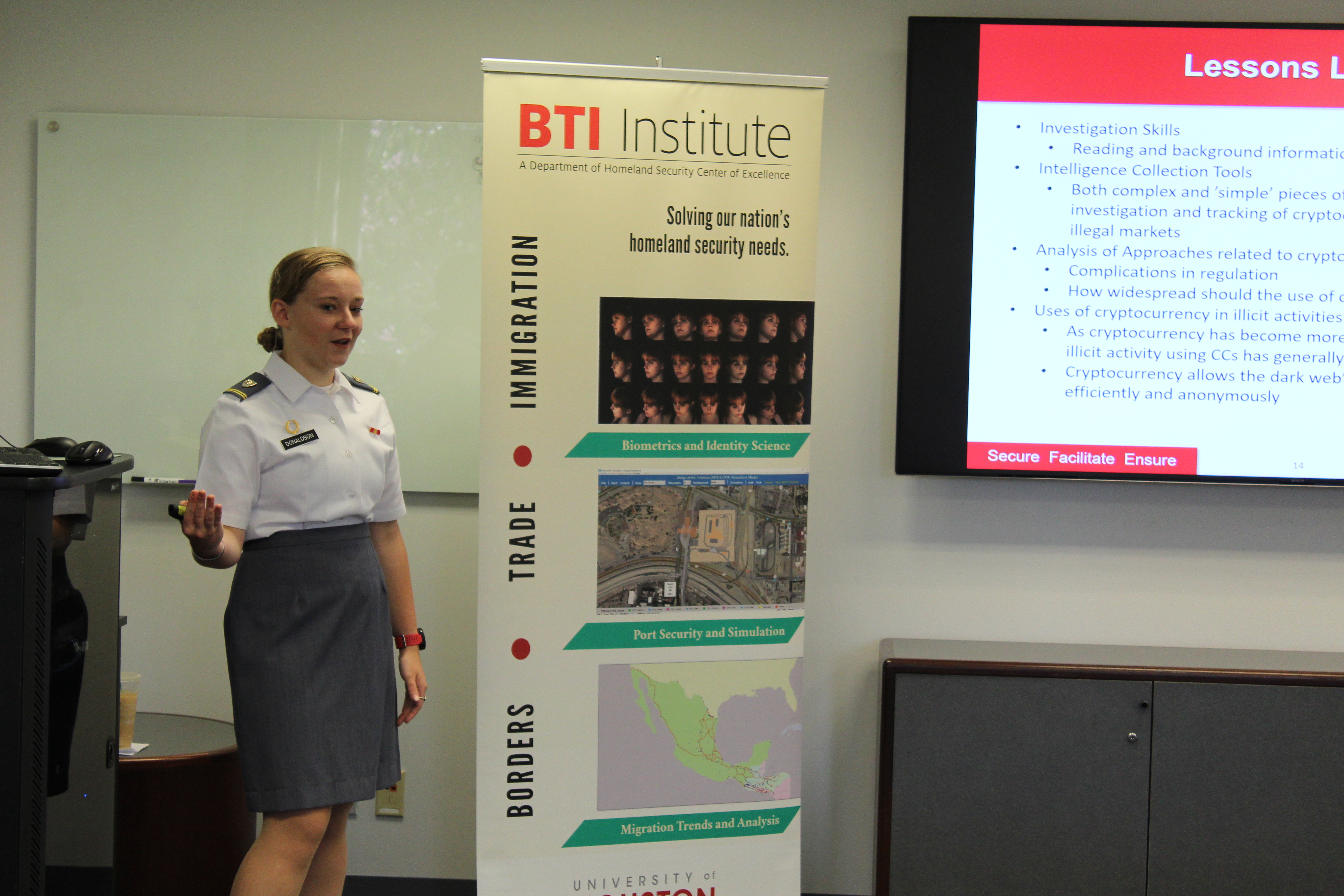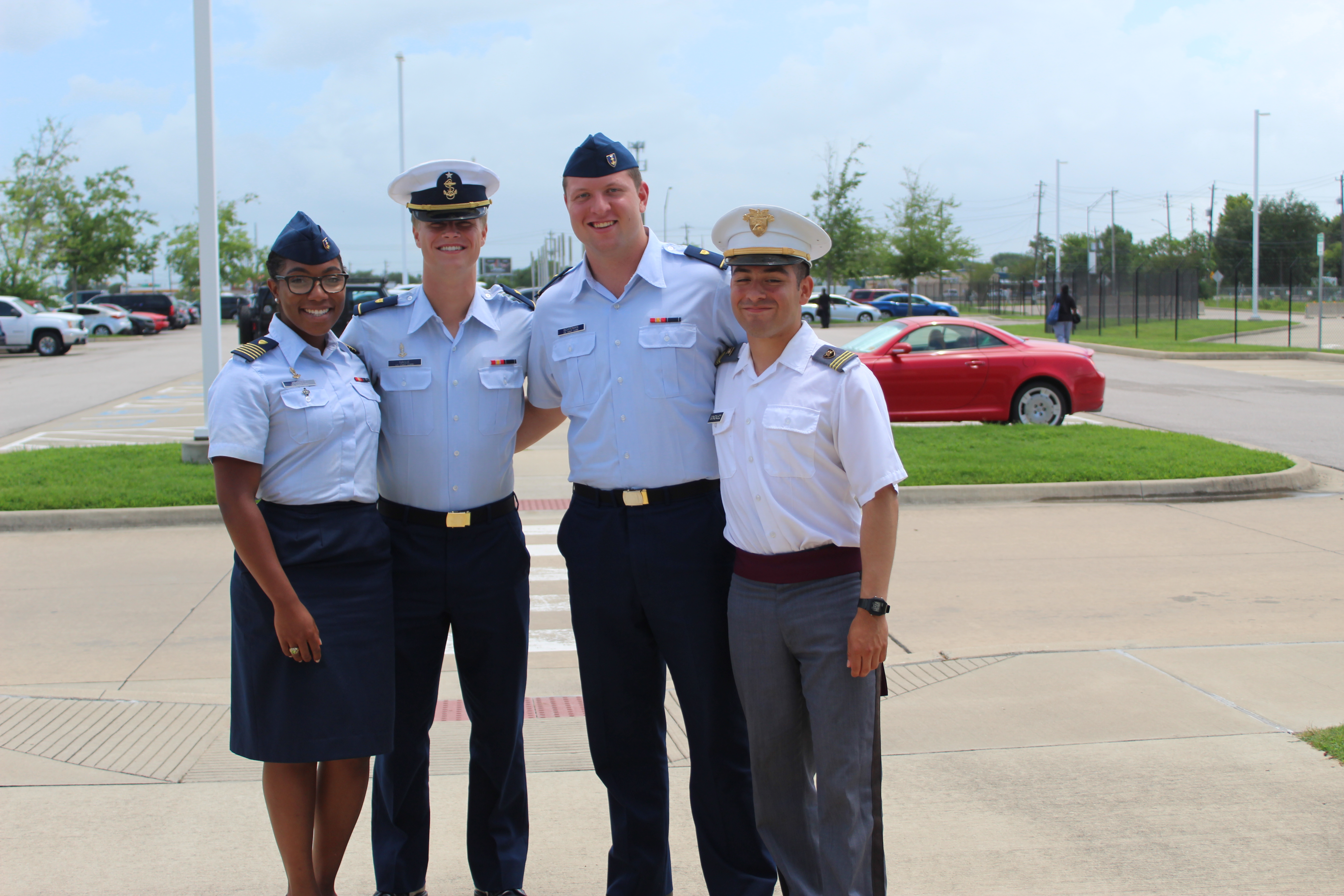Internships
The BTI Institute sponsors interns as a means to encourage academic pursuit in the Homeland Security Enterprise.
Summer Academy Internships
The BTI Institute hosts cadets from the Coast Guard Academy and the United States Military Academy at West Point. The cadets work with ongoing research projects sponsored by the Institute.
Program Year 5 (Summer 2020) - Four Cadets from the U.S. Coast Guard Academy
The BTI Institute hosted four cadets from the United States Coast Guard Academy from 5 July to 16 August 2020. The cadets were paired with a mentor for their research project and briefing. The cadets stayed on the University of Houston campus and conducted their research either in person or remotely.
In addition to their research projects, the cadets toured USCG Sector Houston-Galveston, Space Center Houston and the NASA Johnson Space Center, and other Houston attractions.
|
Oliver Simon, Cadet 1/c, United States Coast Guard Academy Research Mentor: Kevin Clement, Executive Director of Strategic Partnerships, University of Houston College of Technology Project: Maritime Port Resilience Focus: The project focused on creating a regional maritime disaster resilience action plan. While there is currently a national resilience framework, that framework is not focused enough on the complexity of the maritime port. Cadet Simon conducted 16 interviews to focus on the threats associated with maritime ports. Through those interviews, the threats list includes natural hazards (climate change, health), technological hazards (cybersecurity), and manmade threats (terrorism, funding). "Economic competition and the majority of commerce in trade is focused on the maritime sector. With that comes trillions of dollars in trade and even the smallest incidents at a port can have a billion-dollar impact." |
|
Jackson Carpenter, Cadet 1/c, United States Coast Guard Academy Research Mentor: Kevin Clement, Executive Director of Strategic Partnerships, University of Houston College of Technology Project: Complex Coordinated Terrorist Attacks and Active Shooter Incidents Focus: The project focused on after action review recommendations and processes that can be built based on the lessons learned from those AARs. Cadet Carpenter was involved in developing drill cards, which is a document used to walk an emergency responder through performance steps based on the current conditions, such as receiving a call about a suspicious package. "AARs allow the identification of common themes across different incidents that can provide honest, objective, and organized recommendations to improve organizational responses." |
|
Erin Schultz, Cadet 1/c, United States Coast Guard Academy Research Mentor: Gary Hale, Voir Dire International, LLC Project: ArcGIS Analysis of Migrant Caravans from the Northern Triangle Countries Focus: The project studied the hypothesis that U.S. and Mexico immigration policies appear as reactive to the caravan phenomenon. Migrant caravans originating in Central American countries south of Mexico were not seen before 2017. The caravans were configured as a collective, simultaneous and organized movement of thousands of people, for which the U.S. and Mexican governments were not prepared to process. The project looks to caravans as a whole and the factors that contribute to the formation of a caravan, not just individual migration trends. "We were not looking at individual push-pull factors ... individual people, why they would be immigrating to America. It was much more about the caravan and its formation." |
|
S. June Wenzel, Cadet 1/c, United States Coast Guard Academy Research Mentor: Skye Cooley, Ph.D., Assistant Professor of Strategic Communications, Oklahoma State University Project: Intersecting Policy and Narrative: The Migrant Journey Focus: The ultimate goal of the research was to use narrative framework to inform U.S. policymakers of commonalities and areas of cooperation. By utilizing media sources from the U.S., Mexico, and Northern Triangle nations, the researchers were going to better understand the migrant narrative and how that could impact policy development. Narrative themes were identified and compared across specific time periods based on U.S. immigration policy. "The narrative policy framework can unite people's narratives and take the subjective, qualitative data and make it into numeric, scientific information that we can actually analyze and distill into numbers that we can make repeatable." |
In Program Year 4 (summer 2019), the Institute hosted one cadet from USMA.
Cadet Sarah Donaldson, United States Military Academy at West Point, worked with Weidong "Larry" Shi, Ph.D., Associate Professor at the University of Houston, and Chris Bronk, Ph.D., Associate Professor at the University of Houston, on an overview of cybersecurity.

Cadet Sarah Donaldson, an incoming Junior at the United States Military Academy at West Point, spent three weeks studying cryptocurrencies and cybersecurity as part of the BTI Institute 2019 Homeland Security Summer Internship. Cadet Donaldson is a psychology major, minoring in cybersecurity, and desires to commission as a cybersecurity officer in the U.S. Army upon graduation.
Cadet Donaldson conducted a literature review guided by Chris Bronk, Ph.D., Assistant Professor, and Weidong "Larry" Shi, Ph.D., Associate Professor.
Cadet Donaldson's first literature review focused on cryptocurrency and the illicit use within the digital marketplace.
"About 44% of Bitcoin transactions are illegal," said Cadet Donaldson, "including money laundering and drug trafficking."
She also discussed the complexity of attempted regulations.
"Cryptocurrency has no borders," said Cadet Donaldson. "Because it is so international, every government would have to agree on the level and type of regulation."
Cadet Donaldson's second literature review focused on the overall concerns involving cybersecurity.
"It is sometimes difficult for policymakers to understand the complexity of cyber," said Cadet Donaldson. "It can be just as difficult for those that understand cyber to articulate what is required to properly regulate."
Cadet Donaldson discussed the Department of Defense's efforts to modernize its cyber capabilities, including defining cyberspace as its "fifth domain" in line with land, sea, air, and space.
While staying at the University of Houston, Cadet Donaldson also had the opportunity to take a campus tour.
Cadet Donaldson will return to West Point to continue her career towards becoming the United States next cyber leader.

In Program Year 3 (Summer 2018), the Institute hosted three cadets from the Coast Guard Academy and one from USMA.

Cadet Emiliano Gonzalez, from the United States Military Academy, and Cadets William Boardman, Kyla Hughley, and Matthew Nagle, from the United States Coast Guard Academy, conducted literature review research and developed applicable planning products in support of a regional response to a Complex Coordinated Terrorist Attack workshop series. Each cadet was assigned to a different aspect of a regional response including emergency medical services, intelligence or victim support.
Additionally, the cadets researched current institutions that provide certification, undergraduate or graduate-level degrees in the area of border studies to help the BTI Institute enhance our border studies education and workforce development efforts. Finally, the cadets supported the Institute's customer discovery and outreach efforts by researching and building executive read files that included biographies, press releases and congressional testimonies on the Department of Homeland Security leadership.
Though there was plenty of work, there was also time to benefit from what the Houston area has to offer. In addition to enjoying local cuisine, the cadets participated in a guided tour of the NASA Johnson Space Center, the Port of Houston, and the U.S. Coast Guard Sector - Houston.
"There was a lot of tasks that kept us busy but we also had the time to enjoy Houston," said Hughley.
The Homeland Security Summer Internship is intended to familiarize future leaders in the Homeland Security and National Security space with the breadth of operational needs and research opportunities available.
The cadets' final presentations are here:
| Gonzalez | Boardman | Hughley | Nagle |
